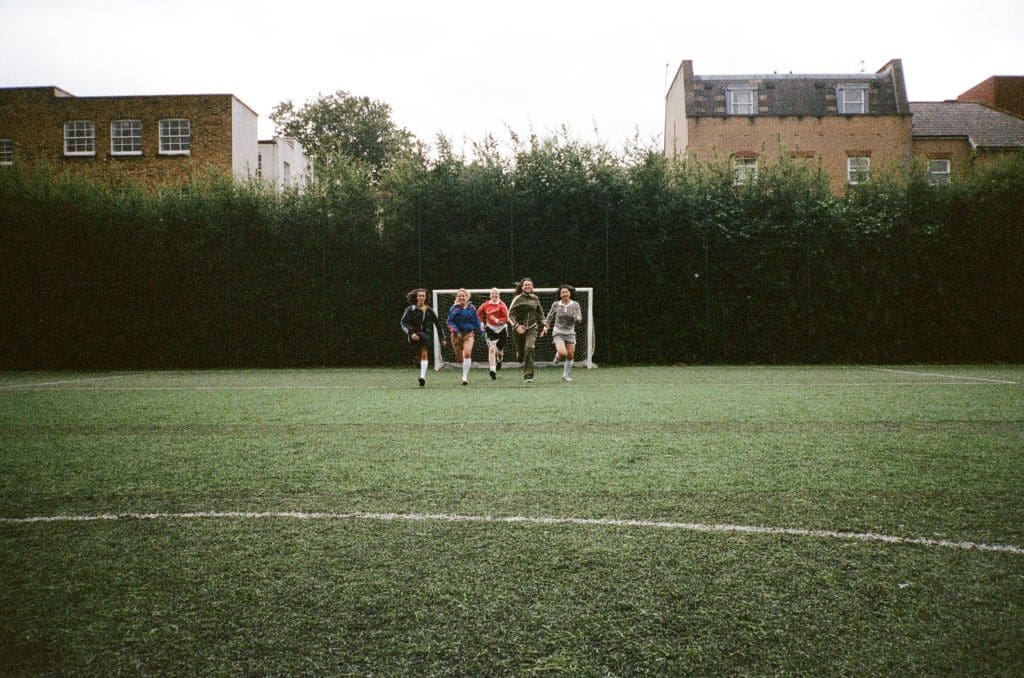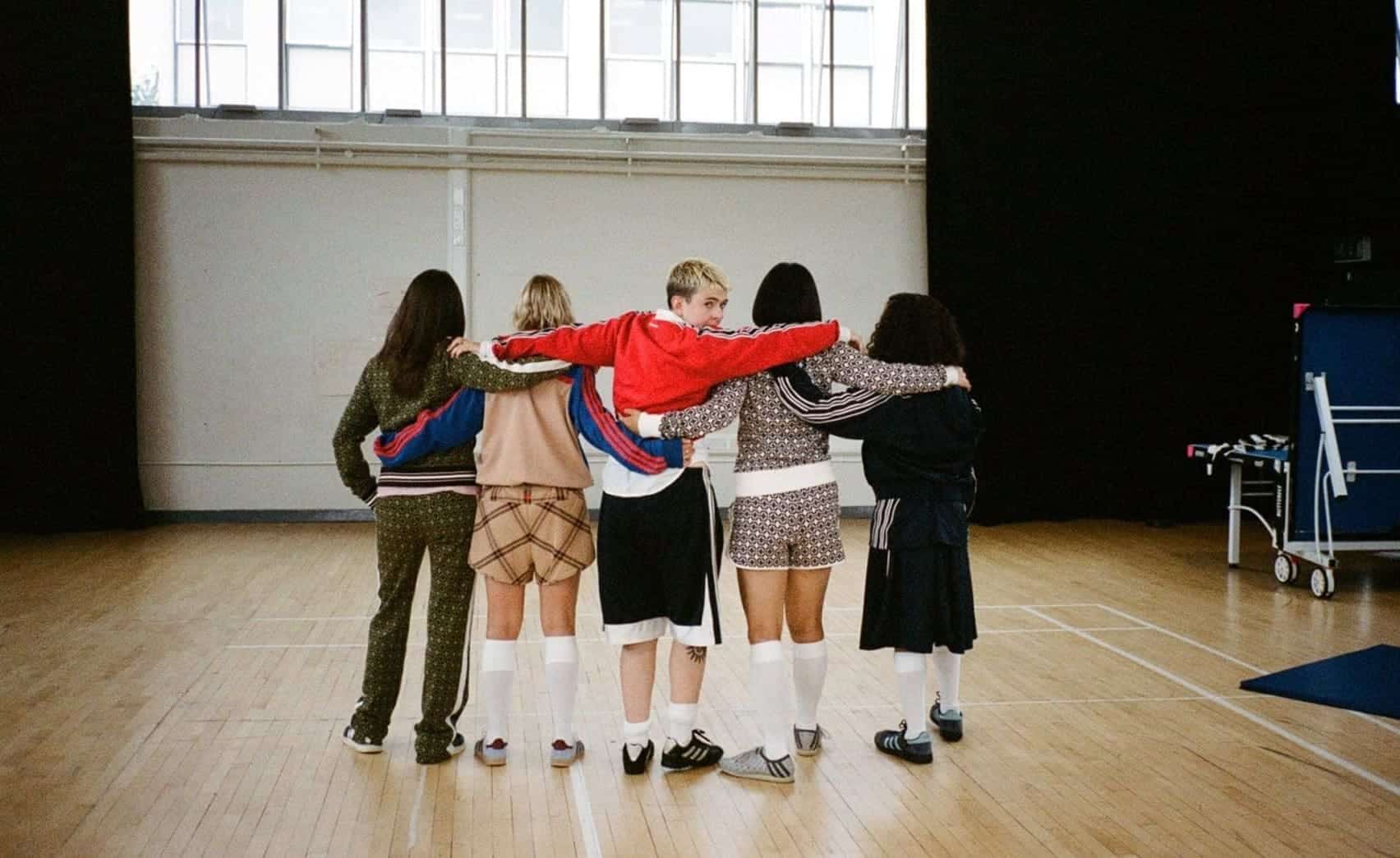
Over the summer, A Rabbit’s Foot spent time following breakthrough director Molly Manning Walker, after her film How to Have Sex stole the Cannes Film Festival and won the prestigious Un Certain Regard prize. After a number of conversations, we invited Molly and members of her Sunday league football team Babe City FC— composed of women in the film and televison industry—for a shoot in East London. The series of photographs taken by Magnum’s Lúa Ribeira, and Fatima Khan reveal a group of women unified by a game, as well as their brilliance in their field. This is Molly Manning Walker.
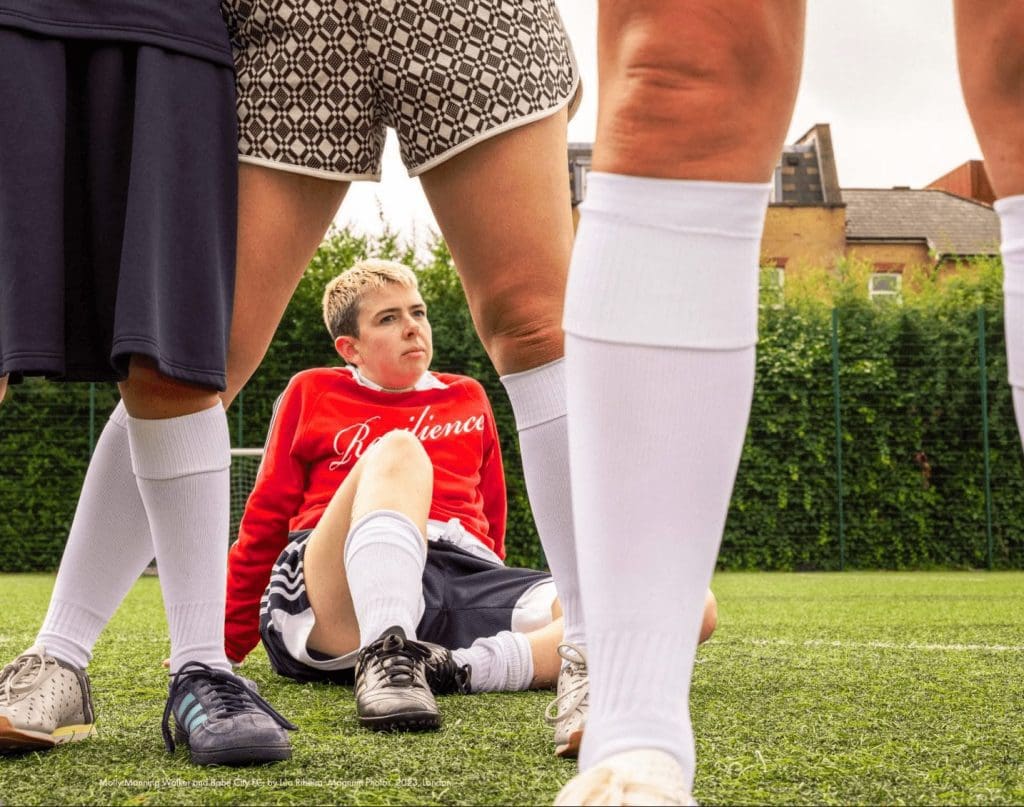
The Prince George pub in Dalston, East London. This small spit-and-sawdust boozer is where it first happened, remarks filmmaker Molly Manning Walker: “I was playing pool in the backroom, and my producer called me to ask if I could go outside. That’s when I found out I was going to Cannes,” she laughs, “but I had to keep it to myself.”
As we sit at the same pub, six months on, it’s fair to say a lot has changed. Molly’s debut feature film How to Have Sex not only screened at Cannes, but went on to win the highly prestigious Un Certain Regard award at the festival—beating out long-established directors like Monia Chokri and Anthony Chen. For those of us on the Croisette that week, it seemed inevitable. Journalists were bewitched by a small British film about three young women on a holiday in Greece and the hard truths they discover about peer pressure and consent. It’s a disturbing, frenetic, strobe-laced tale that unboxes that part of the mind which is still curiously drawn to the youthful experiences of excess and scarring sexual encounters that define our adult lives. It is resonant. It is necessary. It also continues to be screened at festivals around the globe.
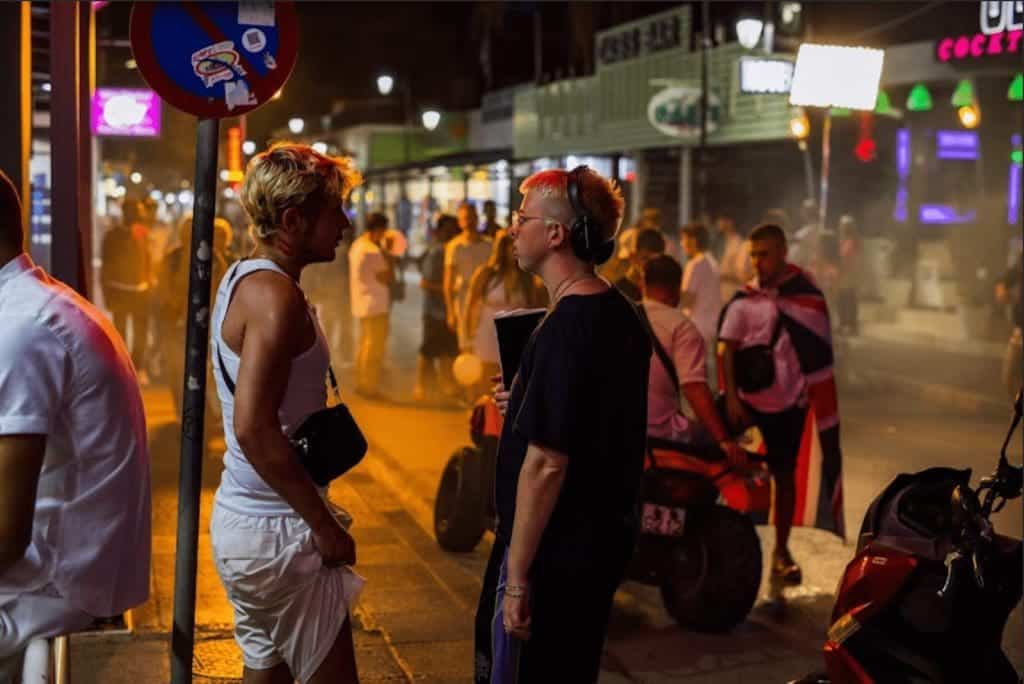
On the surface, Molly is unfazed. She’s just returned from a meeting with a production company in nearby Shoreditch, she explains, but when it comes to future projects, it has to be the right fit, and on her terms. Does she feel the pressure to keep the momentum building after Cannes? “Not really. I could tap out here and be happy to be honest,” she laughs, “but to be honest…I’m too much of a workaholic.”
Molly speaks candidly about the themes in her film. There’s a fear when sitting with certain filmmakers—especially those that are making a strong statement—that you will have to tread delicately around certain subjects. But the frank, sometimes uncomfortable conversations are what Molly wanted the film to encourage from the beginning: “I wanted to change the concept of consent as we understand it. It’s not a matter of yes or no. It’s not black-and-white,” she tells me. “The idea came around when I was at a wedding with a bunch of schoolmates. We were talking about these holidays, and we realised how mad it was that so many people went through similar experiences—they form the basis of so much of how we drink, interact and have sex throughout our lives.”
A motivation in making the film was to put male viewers in a situation where they recognise their own behaviours on-screen—particularly in one important moment where the boundaries of consent are pushed to the point of full-on assault. “I mean, I know that’s an uncomfortable thing to ask of anyone. It would be ideal if they watch that scene and actually confront their own ideas of consent,” she sighs, “but in Cannes, what was really surprising is that a lot of the male audience seemed really defensive.” Prior to production, Molly travelled around the UK to hold focus groups with Generation Z teenagers, presenting them scenes to gauge their understanding of sex and consent. The disheartening feedback from the boys (“they saw a group of lads having fun”) and, surprisingly, the girls (“the girls would complain about the characters’ short skirts”) was enough to secure funding. “We still have a long way to go,” she tells me.
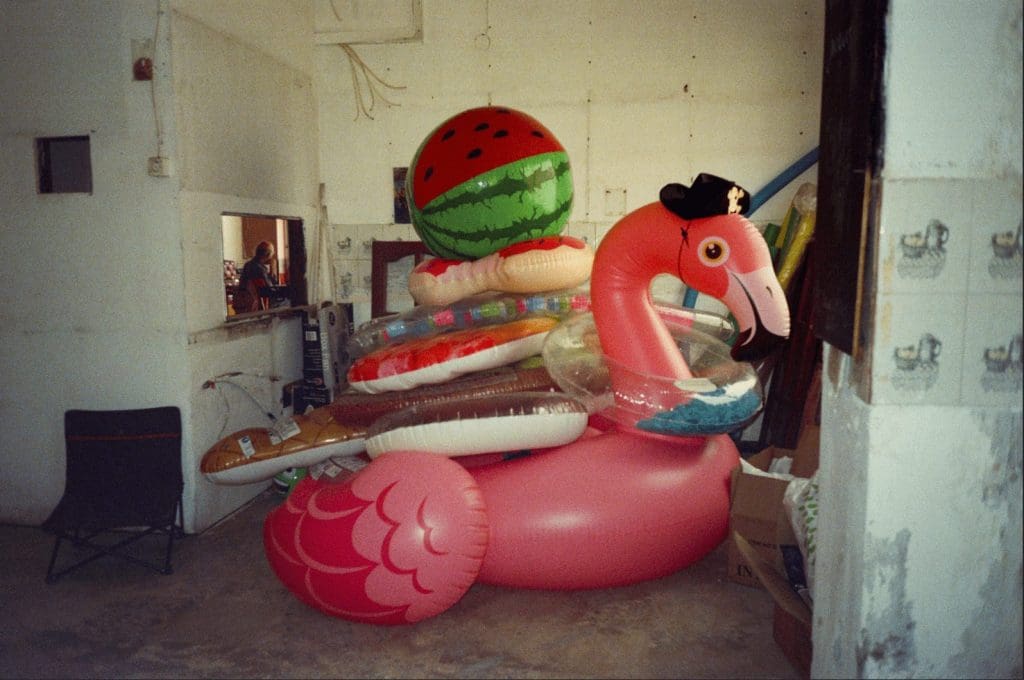
In a couple of weeks from our conversation, Molly will be in Australasia, where there will be screenings and Q&As of How to Have Sex. But there’s an added bonus to her tour; at the same time, the women’s World Cup will be played across the continent. Her face lights up, and her voice shifts from interview-Molly into her more natural London twang, as the conversation moves towards one of her biggest passions: football.
As a Chelsea supporter, and a native West Londoner, she immediately ribs me for being a Tottenham Hotspur fan (“must be miserable for you”), so I make the grave error of mentioning Chelsea’s poor season. “Well,” she replies, “at least the women’s team is still great… can’t say that about Tottenham’s.” Wherever you go in this world—even if it is only halfway across London—there are few better ways to break the ice than mocking someone’s football club.
“My dad was really into it,” Molly explains, when I ask her how she first fell in love with the sport, “But I was always a bit of a tomboy as a teenager, and used to hang out with the boys instead of the girls, playing football; and then I would attend special camps at Brentford in the summer. I used to play religiously until I went to film school, and didn’t have the opportunity to get back into it until Babe City.”
Molly is the co-founder of Babe City FC, a hugely respected Sunday league team for women and non-binary people in the film industry. It has become a safe space for women in her field—many of whom have never played football in their lives, but who recognise the importance of community and the opportunities it offers them to collaborate. “I mean, the whole thing has really gotten out of hand,” she laughs, when I ask how she manages to operate a Sunday league club while picking up prizes at Cannes. “Originally, the whole point was to have some fun with people I was working with on-set. Now there are sixty people in the WhatsApp group, and it’s bigger than me, and manages itself.”
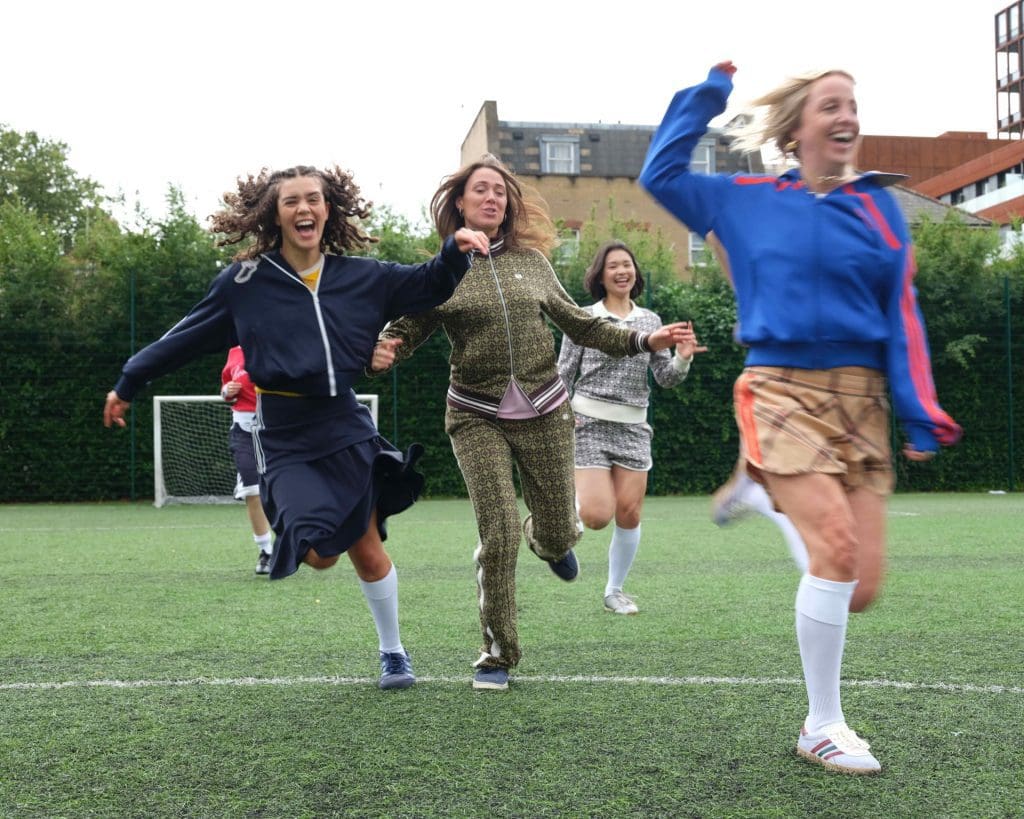
The ‘Babes’ are made up of cinematographers, filmmakers, producers, actors, and their resident costume designer, the talented Georgie Buxton, who has created the stylish orange kits (she also works with England’s Leah Williamson the following week.) Women are so underrepresented in the film industry, Molly adds, that many are either a part of, or at least made aware of, Babe City FC, and some have gone on to work with each other in projects off the pitch. The only criteria for entry, she explains: “Well there are two things! The first is that you can’t be aggressively queer…” What does that mean? “Well, when I tried to join certain teams, before I was queer myself, they’d ask if I was gay. I’d say no, and they wouldn’t want to know.” So, it’s more in line with accepting everyone for who they are. And the second? “No commitment. Which is very tricky, because obviously you have to commit. You can’t drop out two days before a game, or it’s just carnage.”
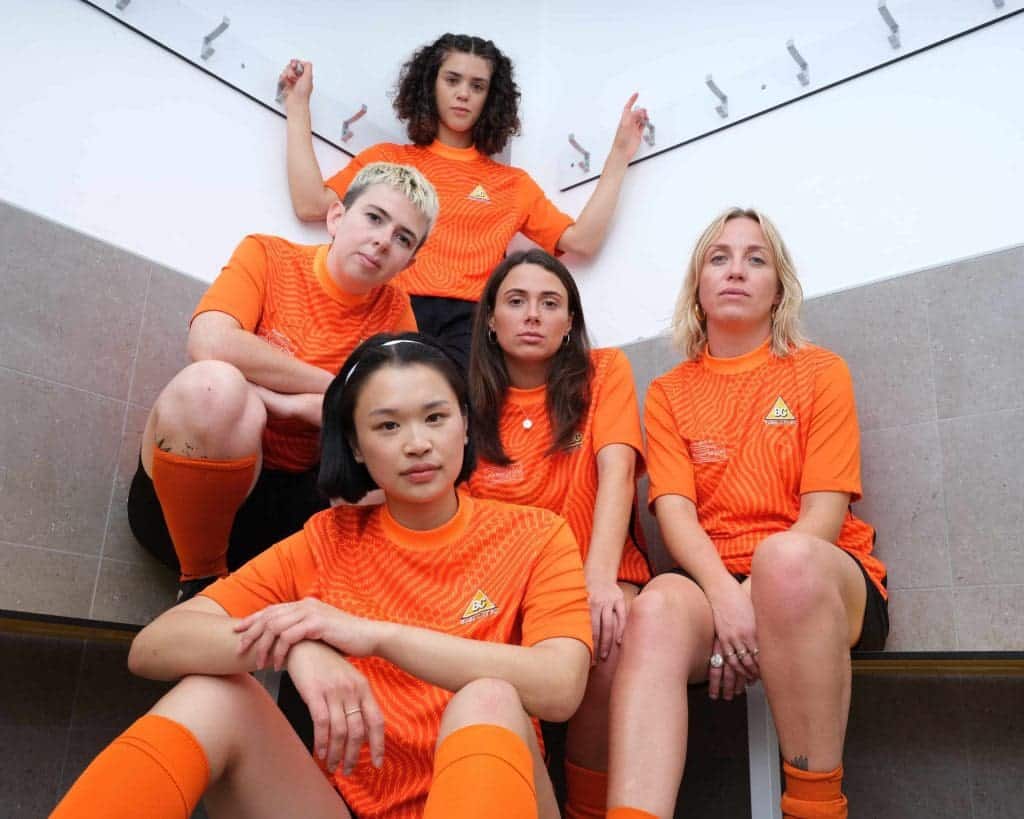
Although some of the members took it on themselves to host summer training camps, Molly’s goal is to broaden their reach to schools, introducing Babe City FC as a way to educate young girls on work in the film industry. “You don’t need many academic qualifications to be a cinematographer. But I feel like our schooling doesn’t really encourage, or even promote, these careers for young people.”
There’s a strong impression with Molly that she is disappointed with the way Britain’s education system continues to fail its students—particularly those who are drawn to creative careers. She mentions watching her brother, a talented musician, struggle for a long period of his life because of how he was judged by his academic results. “I was one of those dickhead kids that didn’t study and did quite well. But my brother was amazing at music. He might not get ‘A’s in everything, but he would excel at music, and he felt discouraged to pursue it. He’s doing well now,” she adds, taking a pause, “but for the longest time he felt he had to go back to university to be a success. I’ve always resented the system for that. It’s OK to be really great at one thing. It should be celebrated…encouraged, even.”
As it happens, the convergence between British state schooling and her passion for football as a teenager will play a big role in her next project, a semi-autobiographical series. It’s early days, and Molly can’t tell me too much at this stage, she admits: “I suppose it’s not about football per-say, but shot through the eyes of football culture. It’s more about how the schooling system fails those of us who aren’t naturally academic.”
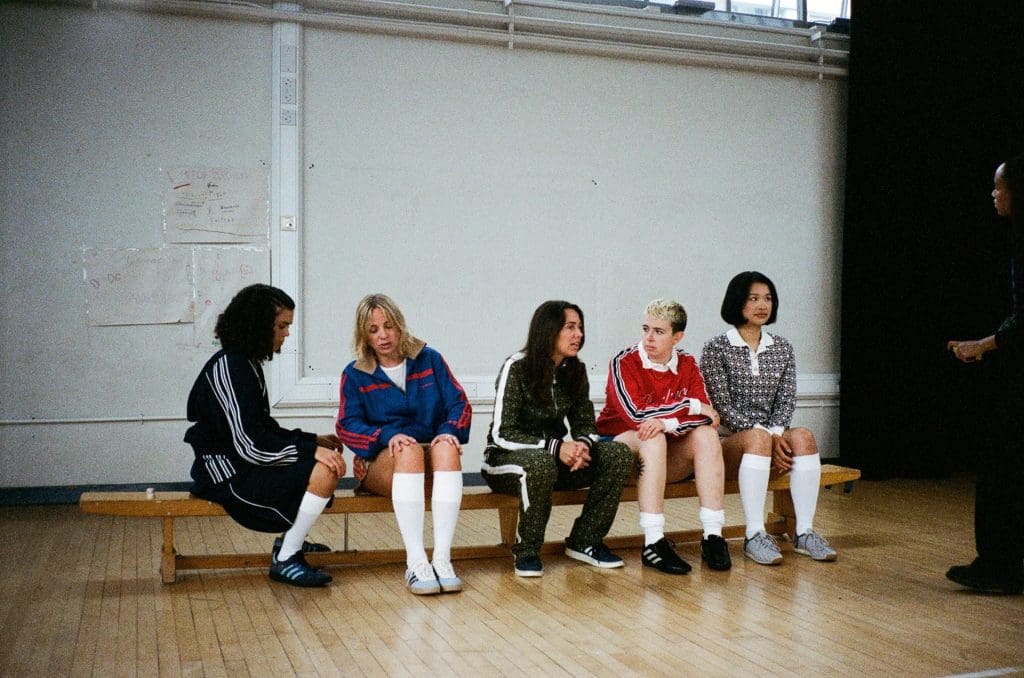
Social issues have always been a strong motivation for Molly to become a filmmaker, and like the greatest artists, she wants her work to enact change, or inspire a conversation (How to Have Sex is still doing that as of writing). It all starts from home, she tells me: her family have always been political. “We would watch a lot of documentaries, so I went into cinematography because I thought I could shoot my own docs, focusing on certain important topics that mattered to me…but then I fell in love with the storytelling too.”
At film school, she discovered movies that were able to transmit a message without sacrificing an engaging narrative, like Jacques Audiard’s A Prophet and Matthieu Kassovitz’s La Haine, which she describes, “as having the most London atmosphere of any film—even though it’s set in Paris.” She also counts Lynn Ramsay and Andrea Arnold as two of the most influential filmmakers. (I hope Molly doesn’t mind me writing that both veterans have traces of their fingerprints in her own work.)
That’s not to say that Molly Manning Walker is anything but an original. Having spent just an hour with her discussing cinema, sports, and politics, there’s a feeling that her work will continue to keep audiences and critics curiously waiting in anticipation for what she has to say, as well as how she says it. But with her trip to Australia in a couple of weeks, she’s earned a little respite from the pressures of whatever comes next—as well as being able to support England in the women’s World Cup (sadly, the excellent Lionesses would be knocked out at the final as of print). “The thing about football,” she adds (it always comes back to football), “is that it keeps me present. It taught me how to lose gracefully, which is important in this industry. Because there are times when you win and times when you have to take a loss…” But, she adds, “it’s also just very fun. And sometimes, that’s the most important thing.”
